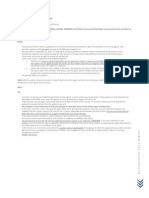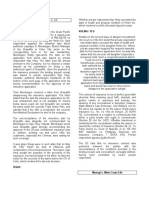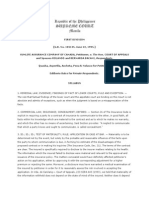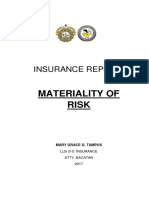56 - Sunlife Assurance Vs Court of Appeals
56 - Sunlife Assurance Vs Court of Appeals
Uploaded by
perlitainocencioCopyright:
Available Formats
56 - Sunlife Assurance Vs Court of Appeals
56 - Sunlife Assurance Vs Court of Appeals
Uploaded by
perlitainocencioOriginal Title
Copyright
Available Formats
Share this document
Did you find this document useful?
Is this content inappropriate?
Copyright:
Available Formats
56 - Sunlife Assurance Vs Court of Appeals
56 - Sunlife Assurance Vs Court of Appeals
Uploaded by
perlitainocencioCopyright:
Available Formats
56 – Sunlife Assurance Company of Canada vs.
Court of Appeals
G.R. No. 105135 June 22, 1995
Digest by Lor Saguinsin
Facts:
1. On April 15, 1986, Robert John B. Bacani procured a life insurance contract for himself from
petitioner.
2. On June 26, 1987, the insured died in a plane crash. Respondent Bernarda Bacani filed a
claim with petitioner, seeking the benefits of the insurance policy taken by her son.
Petitioner conducted an investigation and its findings prompted it to reject the claim.
a. In its letter, petitioner informed respondent Bernarda Bacani, that the insured did
not disclose material facts relevant to the issuance of the policy, thus rendering the
contract of insurance voidable.
b. Petitioner discovered that two weeks prior to his application for insurance, the
insured was examined and confined at the Lung Center of the Philippines, where he
was diagnosed for renal failure. The insured did not disclose this.
Issue:
1. Whether the material undisclosed was relevant to the issuance of the policy that would
render it voidable? (YES)
Held:
1. Petitioner properly exercised its right to rescind the contract of insurance by reason of the
concealment employed by the insured. It must be emphasized that rescission was exercised within the
two-year contestability period as recognized in Section 48 of The Insurance Code.
Section 26 of the Insurance Code is explicit in requiring a party to a contract of insurance to
communicate to the other, in good faith, all facts within his knowledge which are material to
the contract and as to which he makes no warranty, and which the other has no means of
ascertaining.
o Materiality is to be determined not by the event, but solely by the probable and
reasonable influence of the facts upon the party to whom communication is due, in
forming his estimate of the disadvantages of the proposed contract or in making his
inquiries.
The terms of the contract are clear. The insured is specifically required to disclose to the
insurer matters relating to his health. Materiality of the information withheld does not
depend on the state of mind of the insured. Neither does it depend on the actual or physical
events which ensue. Thus, "goad faith" is no defense in concealment.
The insured's failure to disclose the fact that he was hospitalized for two weeks prior to filing
his application for insurance, raises grave doubts about his bonafides. It appears that such
concealment was deliberate on his part.
o The information which the insured failed to disclose were material and relevant to
the approval and issuance of the insurance policy. The matters concealed would
have definitely affected petitioner's action on his application, either by approving it
with the corresponding adjustment for a higher premium or rejecting the same.
Anent the finding that the facts concealed had no bearing to the cause of death of the
insured, it is well settled that the insured need not die of the disease he had failed to disclose
to the insurer. It is sufficient that his non-disclosure misled the insurer in forming his
estimates of the risks of the proposed insurance policy or in making inquiries
You might also like
- Principles of Insurance Law with Case StudiesFrom EverandPrinciples of Insurance Law with Case StudiesRating: 5 out of 5 stars5/5 (1)
- Annex A (Lease Contract)Document3 pagesAnnex A (Lease Contract)Clarisse30No ratings yet
- Sunlife Assurance Company vs. CADocument1 pageSunlife Assurance Company vs. CAJohn Mark RevillaNo ratings yet
- Sunlife Assurance Company of Canada Vs CA G.R. No. 105135Document2 pagesSunlife Assurance Company of Canada Vs CA G.R. No. 105135Vince Michael OngNo ratings yet
- 44.sun Life Assurance Vs CADocument2 pages44.sun Life Assurance Vs CAMariny Del rosarioNo ratings yet
- Sun Assurance Company of Canada vs. Court of AppelasDocument2 pagesSun Assurance Company of Canada vs. Court of AppelasMay RMNo ratings yet
- Sunlife Vs CADocument2 pagesSunlife Vs CAstealthestars8100% (1)
- Sun Life Assurance v. CADocument2 pagesSun Life Assurance v. CAJellynNo ratings yet
- Sunlife Assurance Vs CA, 245 SCRA 268Document1 pageSunlife Assurance Vs CA, 245 SCRA 268rengieNo ratings yet
- Concealment: Insurance Law Case Digests SY 2010-2011Document1 pageConcealment: Insurance Law Case Digests SY 2010-2011BreAmberNo ratings yet
- INSURANCE - Sun Life Assurance - Vs - CA and Sps. BacaniDocument2 pagesINSURANCE - Sun Life Assurance - Vs - CA and Sps. Bacanimichelle zatarainNo ratings yet
- Insurance Digest Part 2 6Document37 pagesInsurance Digest Part 2 6Anonymous 7KthFJ1km0% (1)
- Sunlight Assurance Co. V CADocument1 pageSunlight Assurance Co. V CAvaleryannsNo ratings yet
- Sunlife Assurance Company Vs CADocument2 pagesSunlife Assurance Company Vs CApaul2574No ratings yet
- Sun Life v. CADocument1 pageSun Life v. CAMacy TangNo ratings yet
- Cases 3 InsuranceDocument14 pagesCases 3 InsuranceBeverlyn JamisonNo ratings yet
- Insurance Finals Compilation 3Document7 pagesInsurance Finals Compilation 3Phi SalvadorNo ratings yet
- Sun Life V BacaniDocument2 pagesSun Life V BacaniSimon James SemillaNo ratings yet
- Insurance Jul 31Document13 pagesInsurance Jul 31Don VillegasNo ratings yet
- Insurance Jul 31Document13 pagesInsurance Jul 31Don VillegasNo ratings yet
- 62 Sunlife Assurance Company of Canada v. CADocument2 pages62 Sunlife Assurance Company of Canada v. CAFrances Ricci SalgadoNo ratings yet
- Case 19. Vda. de Canilang Vs CA (1993)Document4 pagesCase 19. Vda. de Canilang Vs CA (1993)Aya NamuzarNo ratings yet
- Sunlife Vs CA June 22, 1995Document1 pageSunlife Vs CA June 22, 1995Alvin-Evelyn GuloyNo ratings yet
- Case Digest ConcealmentDocument5 pagesCase Digest ConcealmentMadeleine Flores Bayani0% (1)
- Insurance Nov 23Document10 pagesInsurance Nov 23Pearl Deinne Ponce de LeonNo ratings yet
- Insurance Notes FINALDocument24 pagesInsurance Notes FINALKaren Daryl BritoNo ratings yet
- Insurance CasesDocument3 pagesInsurance CasesBen Bayantol MampaoNo ratings yet
- 7 Sunlife Assurance Co of Canada V CA and Sps BacaniDocument3 pages7 Sunlife Assurance Co of Canada V CA and Sps BacaniGin FranciscoNo ratings yet
- THELMA VDA. DE CANILANG, Petitioner, vs. Hon. Court of Appeals and Great Pacific Life Assurance Corporation, Respondents. FactsDocument24 pagesTHELMA VDA. DE CANILANG, Petitioner, vs. Hon. Court of Appeals and Great Pacific Life Assurance Corporation, Respondents. FactsMarkB15No ratings yet
- Sunlife Vs CADocument1 pageSunlife Vs CAMir SolaimanNo ratings yet
- Great Pacific Life V. Ca: Facts: Ruling: YesDocument11 pagesGreat Pacific Life V. Ca: Facts: Ruling: YesMark Joseph M. VirgilioNo ratings yet
- Sun Life Ass Co Vs CADocument4 pagesSun Life Ass Co Vs CACharlesNo ratings yet
- G.R. No. 105135 June 22, 1995 - Sunlife Assurance Company of Canada v. Court of Appeals, Et Al.Document8 pagesG.R. No. 105135 June 22, 1995 - Sunlife Assurance Company of Canada v. Court of Appeals, Et Al.Vanny Gimotea BaluyutNo ratings yet
- Ascertaining and Controlling RisksDocument32 pagesAscertaining and Controlling RisksJuan VillanuevaNo ratings yet
- Ascertaining and Controlling RisksDocument41 pagesAscertaining and Controlling RisksUser 010897020197No ratings yet
- Sunlife Assurance of Canada vs. CA GR No. 105135 June 22 1995Document4 pagesSunlife Assurance of Canada vs. CA GR No. 105135 June 22 1995wenny capplemanNo ratings yet
- Sun Life V CADocument2 pagesSun Life V CAmb_estanislao100% (1)
- Insurance Law: Beneficiary: Effects: Irrevocable Beneficiary (2005)Document32 pagesInsurance Law: Beneficiary: Effects: Irrevocable Beneficiary (2005)alyza burdeosNo ratings yet
- Concealment and MisrepresentationDocument8 pagesConcealment and Misrepresentationcrystine jaye senadreNo ratings yet
- Insurance Cases 3rd YrDocument7 pagesInsurance Cases 3rd YrMary Ann IsananNo ratings yet
- Insurance Digest ConcealmentDocument4 pagesInsurance Digest ConcealmentWresen Ann JavaluyasNo ratings yet
- Insurance Digests 3Document10 pagesInsurance Digests 3MaryStefanieNo ratings yet
- Argente V West CoastDocument3 pagesArgente V West CoastRoland OliquinoNo ratings yet
- Insurance Cases Set 2 (DIGESTS)Document5 pagesInsurance Cases Set 2 (DIGESTS)AMB100% (1)
- Insurance Case DigestDocument33 pagesInsurance Case DigestjumpincatfishNo ratings yet
- Insurance Digest 2nd SetDocument4 pagesInsurance Digest 2nd SetMis DeeNo ratings yet
- Materiality of Risk (Insurance)Document4 pagesMateriality of Risk (Insurance)MoireeG0% (1)
- Insurance Law Case Digest August 21 2019Document19 pagesInsurance Law Case Digest August 21 2019Ma.Rebecca Fe MelendresNo ratings yet
- Insurance Bar Q&A Compilation 2000-2022Document70 pagesInsurance Bar Q&A Compilation 2000-2022Shielah Baguec100% (1)
- DADs Insurance DigestsDocument12 pagesDADs Insurance DigestsNicole PTNo ratings yet
- Sun Life Assurance Corp. of Canada V Court of Appeals (245 SCRA 268)Document7 pagesSun Life Assurance Corp. of Canada V Court of Appeals (245 SCRA 268)Florz GelarzNo ratings yet
- Ascertaining and Controlling RisksDocument23 pagesAscertaining and Controlling RisksAngelica Joyce DyNo ratings yet
- NG Gan Zee v. Asian Crusader Life Assurance CorpDocument7 pagesNG Gan Zee v. Asian Crusader Life Assurance Corpmisty-sunNo ratings yet
- CASES3Document5 pagesCASES3Mitchie GumeraNo ratings yet
- Group 2 RepresentationDocument22 pagesGroup 2 RepresentationRichie SalubreNo ratings yet
- Revealing The Reality Behind The Insurance Companies: Case Study Under Section 45.Document29 pagesRevealing The Reality Behind The Insurance Companies: Case Study Under Section 45.Raja MedaNo ratings yet
- Insurance Law BAR QDocument29 pagesInsurance Law BAR QYour Public ProfileNo ratings yet
- 067 Sunlife V BacaniDocument1 page067 Sunlife V BacaniD De Leon100% (1)
- Life, Accident and Health Insurance in the United StatesFrom EverandLife, Accident and Health Insurance in the United StatesRating: 5 out of 5 stars5/5 (1)
- Judge Gito - Preweek STRATEGIC LECTURE IN POLITICAL LAW - GMGDocument387 pagesJudge Gito - Preweek STRATEGIC LECTURE IN POLITICAL LAW - GMGperlitainocencioNo ratings yet
- AF - GX Classes 2024Document1 pageAF - GX Classes 2024perlitainocencioNo ratings yet
- 2023 08 29 Handbook On Workers Statutory Monetary Benefits 2023editionDocument80 pages2023 08 29 Handbook On Workers Statutory Monetary Benefits 2023editionscalpelwizardNo ratings yet
- XXX HO# 27 - Civil Law - Property and Land RegistrationDocument17 pagesXXX HO# 27 - Civil Law - Property and Land RegistrationperlitainocencioNo ratings yet
- XXX HO#42 - Labor LawDocument8 pagesXXX HO#42 - Labor LawperlitainocencioNo ratings yet
- XXX Legal Edge HO No 41 - Chair's Cases in Labor LawDocument20 pagesXXX Legal Edge HO No 41 - Chair's Cases in Labor LawperlitainocencioNo ratings yet
- XXX HO#45 - Labor LawDocument4 pagesXXX HO#45 - Labor LawperlitainocencioNo ratings yet
- XXX HO#43 - Labor LawDocument13 pagesXXX HO#43 - Labor LawperlitainocencioNo ratings yet
- XXX HO#30 - Civil Law - Credit TransactionsDocument7 pagesXXX HO#30 - Civil Law - Credit TransactionsperlitainocencioNo ratings yet
- Strategic Lecture in Constitutional Law IiDocument199 pagesStrategic Lecture in Constitutional Law IiperlitainocencioNo ratings yet
- 2016 Revised PAO Operations Manual PurposeDocument29 pages2016 Revised PAO Operations Manual PurposeperlitainocencioNo ratings yet
- XXX Legal Edge HO No 39 - Political LawDocument11 pagesXXX Legal Edge HO No 39 - Political Lawperlitainocencio0% (1)
- XXX LEGAL ETHICSDocument12 pagesXXX LEGAL ETHICSperlitainocencioNo ratings yet
- XXX Atty. Anjo David - Legal EDGE-Chair Cases Political LawDocument30 pagesXXX Atty. Anjo David - Legal EDGE-Chair Cases Political LawperlitainocencioNo ratings yet
- XXX Atty. de Jesus - SCL (For Legal Edge 7july2018) PDFDocument141 pagesXXX Atty. de Jesus - SCL (For Legal Edge 7july2018) PDFperlitainocencioNo ratings yet
- Toxicology PDFDocument5 pagesToxicology PDFperlitainocencioNo ratings yet
- How To Get Your Cetificates Apostilled in South KoreaDocument8 pagesHow To Get Your Cetificates Apostilled in South KoreaPurushothamanNo ratings yet
- 1-Ang Giok Chip vs. Springfield Fire and Marine Insurance CoDocument7 pages1-Ang Giok Chip vs. Springfield Fire and Marine Insurance CoFrederick BarilloNo ratings yet
- Kinds of RedemptionDocument18 pagesKinds of RedemptionArJan100% (1)
- Sca 15151 2023 - GJ HC 24057547 2023 - 1 - 01 09 2023Document3 pagesSca 15151 2023 - GJ HC 24057547 2023 - 1 - 01 09 2023dlo godhraNo ratings yet
- Conditional Sale DeedDocument5 pagesConditional Sale DeedvishalsolsheNo ratings yet
- Book Civil Procedure by RegaladoDocument1,012 pagesBook Civil Procedure by RegaladoMenchie Ann Sabandal Salinas94% (36)
- Pinelands FileDocument14 pagesPinelands Filethe kingfish100% (1)
- .R. No. 204117 July 1, 2015 China Banking Corporation, Petitioner, City Treasurer of Manila, RespondentDocument2 pages.R. No. 204117 July 1, 2015 China Banking Corporation, Petitioner, City Treasurer of Manila, RespondentarloNo ratings yet
- 41 Padre Vs Badillo GR No 165423Document2 pages41 Padre Vs Badillo GR No 165423Victoria Melissa Cortejos PulidoNo ratings yet
- Notification For Direct Admission Round Batch 2023Document5 pagesNotification For Direct Admission Round Batch 2023hemantNo ratings yet
- Office of Chief JusticeDocument3 pagesOffice of Chief JusticeMamoriri RadebeNo ratings yet
- Insurance Claims Audit ProgramDocument2 pagesInsurance Claims Audit ProgramWaseem Ahmed67% (3)
- Sample Wedding Contract TemplateDocument4 pagesSample Wedding Contract Templateaidanajihah100% (2)
- Coconut Oil Refiners vs. Torres (Digest)Document2 pagesCoconut Oil Refiners vs. Torres (Digest)timmelicious100% (3)
- Mutants & Masterminds - Third Edition - Threat Report - Looking Glass Gang 2Document5 pagesMutants & Masterminds - Third Edition - Threat Report - Looking Glass Gang 2Gino Forest100% (1)
- Can A Contractor Claim For Loss of Profit On Omitted WorksDocument2 pagesCan A Contractor Claim For Loss of Profit On Omitted WorksMdms Payoe100% (1)
- Vacancy Notification: EssentialDocument2 pagesVacancy Notification: Essentialconfirm@No ratings yet
- Case Brief - OSG Vs Ayala Land IncorporatedDocument8 pagesCase Brief - OSG Vs Ayala Land IncorporatedJeff SarabusingNo ratings yet
- LMRW Case BriefDocument15 pagesLMRW Case BriefRashalee GayleNo ratings yet
- Labor Law Case DigestsDocument6 pagesLabor Law Case DigestsGlenda TavasNo ratings yet
- VOL. 537, OCTOBER 19, 2007 373: Silverio vs. RepublicDocument1 pageVOL. 537, OCTOBER 19, 2007 373: Silverio vs. RepublicpjNo ratings yet
- 4 Prudential Bank Trust Co. v. ReyesDocument16 pages4 Prudential Bank Trust Co. v. ReyesMishel EscañoNo ratings yet
- Tutorial MLS - Charter of JusticeDocument3 pagesTutorial MLS - Charter of Justicezepandarr100% (1)
- Revision of Village RecordsDocument12 pagesRevision of Village RecordsParth RajNo ratings yet
- Force MajeureDocument3 pagesForce MajeureAyushNo ratings yet
- Miranda, Jr. vs. Alvarez, Sr. DigestDocument4 pagesMiranda, Jr. vs. Alvarez, Sr. DigestEmir MendozaNo ratings yet
- Appointment Reciept PaidDocument3 pagesAppointment Reciept PaidSrinibasNo ratings yet
- Subject: Amendments To Rules of Enlistment of Contractors in CPWD, 2005 (Section 34 and Appendix 34 of CPWD Works Manual 2007)Document48 pagesSubject: Amendments To Rules of Enlistment of Contractors in CPWD, 2005 (Section 34 and Appendix 34 of CPWD Works Manual 2007)ravilaad83No ratings yet
- CHETAN PRAKASH VS MET INSTITUTE OF COMPUTER SCIENCES ppt1Document10 pagesCHETAN PRAKASH VS MET INSTITUTE OF COMPUTER SCIENCES ppt1Rahul KumarNo ratings yet









































































































